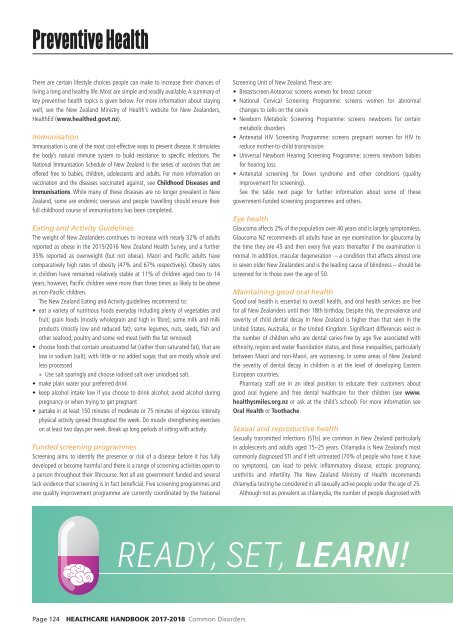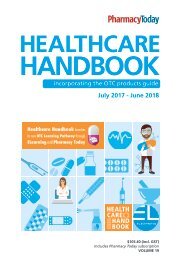2017 HCHB_digital
Create successful ePaper yourself
Turn your PDF publications into a flip-book with our unique Google optimized e-Paper software.
Preventive Health<br />
There are certain lifestyle choices people can make to increase their chances of<br />
living a long and healthy life. Most are simple and readily available. A summary of<br />
key preventive health topics is given below. For more information about staying<br />
well, see the New Zealand Ministry of Health’s website for New Zealanders,<br />
HealthEd (www.healthed.govt.nz).<br />
Immunisation<br />
Immunisation is one of the most cost-effective ways to prevent disease. It stimulates<br />
the body’s natural immune system to build resistance to specific infections. The<br />
National Immunisation Schedule of New Zealand is the series of vaccines that are<br />
offered free to babies, children, adolescents and adults. For more information on<br />
vaccination and the diseases vaccinated against, see Childhood Diseases and<br />
Immunisations. While many of these diseases are no longer prevalent in New<br />
Zealand, some are endemic overseas and people travelling should ensure their<br />
full childhood course of immunisations has been completed.<br />
Eating and Activity Guidelines<br />
The weight of New Zealanders continues to increase with nearly 32% of adults<br />
reported as obese in the 2015/2016 New Zealand Health Survey, and a further<br />
35% reported as overweight (but not obese). Maori and Pacific adults have<br />
comparatively high rates of obesity (47% and 67% respectively). Obesity rates<br />
in children have remained relatively stable at 11% of children aged two to 14<br />
years; however, Pacific children were more than three times as likely to be obese<br />
as non-Pacific children.<br />
The New Zealand Eating and Activity guidelines recommend to:<br />
• eat a variety of nutritious foods everyday including plenty of vegetables and<br />
fruit; grain foods (mostly wholegrain and high in fibre); some milk and milk<br />
products (mostly low and reduced fat); some legumes, nuts, seeds, fish and<br />
other seafood; poultry and some red meat (with the fat removed)<br />
• choose foods that contain unsaturated fat (rather than saturated fat), that are<br />
low in sodium (salt), with little or no added sugar, that are mostly whole and<br />
less processed<br />
»»<br />
Use salt sparingly and choose iodised salt over uniodised salt.<br />
• make plain water your preferred drink<br />
• keep alcohol intake low if you choose to drink alcohol; avoid alcohol during<br />
pregnancy or when trying to get pregnant<br />
• partake in at least 150 minutes of moderate or 75 minutes of vigorous intensity<br />
physical activity spread throughout the week. Do muscle strengthening exercises<br />
on at least two days per week. Break up long periods of sitting with activity.<br />
Funded screening programmes<br />
Screening aims to identify the presence or risk of a disease before it has fully<br />
developed or become harmful and there is a range of screening activities open to<br />
a person throughout their lifecourse. Not all are government funded and several<br />
lack evidence that screening is in fact beneficial. Five screening programmes and<br />
one quality improvement programme are currently coordinated by the National<br />
Screening Unit of New Zealand. These are:<br />
• Breastscreen Aotearoa: screens women for breast cancer<br />
• National Cervical Screening Programme: screens women for abnormal<br />
changes to cells on the cervix<br />
• Newborn Metabolic Screening Programme: screens newborns for certain<br />
metabolic disorders<br />
• Antenatal HIV Screening Programme: screens pregnant women for HIV to<br />
reduce mother-to-child transmission<br />
• Universal Newborn Hearing Screening Programme: screens newborn babies<br />
for hearing loss<br />
• Antenatal screening for Down syndrome and other conditions (quality<br />
improvement for screening).<br />
See the table next page for further information about some of these<br />
government-funded screening programmes and others.<br />
Eye health<br />
Glaucoma affects 2% of the population over 40 years and is largely symptomless.<br />
Glaucoma NZ recommends all adults have an eye examination for glaucoma by<br />
the time they are 45 and then every five years thereafter if the examination is<br />
normal. In addition, macular degeneration – a condition that affects almost one<br />
in seven older New Zealanders and is the leading cause of blindness – should be<br />
screened for in those over the age of 50.<br />
Maintaining good oral health<br />
Good oral health is essential to overall health, and oral health services are free<br />
for all New Zealanders until their 18th birthday. Despite this, the prevalence and<br />
severity of child dental decay In New Zealand is higher than that seen in the<br />
United States, Australia, or the United Kingdom. Significant differences exist in<br />
the number of children who are dental caries-free by age five associated with<br />
ethnicity, region and water fluoridation status, and these inequalities, particularly<br />
between Maori and non-Maori, are worsening. In some areas of New Zealand<br />
the severity of dental decay in children is at the level of developing Eastern<br />
European countries.<br />
Pharmacy staff are in an ideal position to educate their customers about<br />
good oral hygiene and free dental healthcare for their children (see www.<br />
healthysmiles.org.nz or ask at the child’s school). For more information see<br />
Oral Health or Toothache.<br />
Sexual and reproductive health<br />
Sexually transmitted infections (STIs) are common in New Zealand particularly<br />
in adolescents and adults aged 15–25 years. Chlamydia is New Zealand’s most<br />
commonly diagnosed STI and if left untreated (70% of people who have it have<br />
no symptoms), can lead to pelvic inflammatory disease, ectopic pregnancy,<br />
urethritis and infertility. The New Zealand Ministry of Health recommends<br />
chlamydia testing be considered in all sexually active people under the age of 25.<br />
Although not as prevalent as chlamydia, the number of people diagnosed with<br />
READY, SET, LEARN!<br />
Page 124 HEALTHCARE HANDBOOK <strong>2017</strong>-2018 Common Disorders



